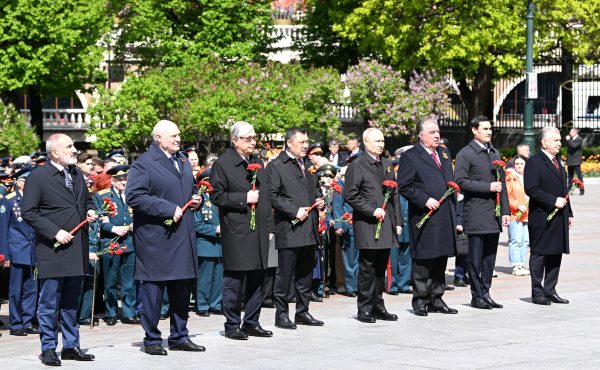All five Central Asian presidents joined Russian President Vladimir Putin for the annual May 9 Victory Day parade. Alongside Putin and the presidents of Armenia and Belarus, the gathered presidents watched a scaled-down military parade at Red Square and placed flowers at the nearby Tomb of the Unknown Soldier.
The May 9 holiday marks the surrender of Nazi Germany and the end of World War II, known as the Great Patriotic War across the former Soviet Union. The Soviet Union lost as many as 27 million people during World War II, an immense sacrifice of lives from Russia, but also Ukraine, Belarus, and the other constituent Soviet republics. To put that figure in perspective, the estimated number of German deaths was somewhere between 6.9 and 7.4 million; the United States lost 419,400 to the war and France lost 600,000.
On the 65th anniversary in 2010, Putin hosted leaders from Europe — including most notably then-German Chancellor Angela Merkel — attended the May 9 parade in Moscow. But particularly after the Russian annexation of Crimea in 2014, rather than marking a moment of great global cooperation in the fight against fascism, the Victory Day holiday has been transformed into a nationalistic display.
In his speech this year, Putin spoke from an alternate reality in which Russia is the defender of peace, freedom, and stability and not the aggressor in a war in Europe. “We believe that any ideology of superiority is inherently disgusting, criminal and deadly,” Putin said before decrying “Western globalist elites” for “provoking bloody conflicts and upheaval,” sowing hatred and Russophobia, professing an “aggressive nationalism,” and destroying traditional family values. It’s a now-standard list of Putin’s grievances.
Diplomat Brief
Weekly Newsletter
N
Get briefed on the story of the week, and developing stories to watch across the Asia-Pacific.
Get the Newsletter
Putin complained of Soviet monuments being taken down and claimed “a real cult of the Nazis and their accomplices is being created, and the memory of true heroes is being erased and slandered.”
The Russian president did mention the sacrifices of the United States and others in World War II, but in a fashion that not-so-subtly critiqued the West for neglecting to honor Soviet sacrifices.
Without apparent irony, Putin said, “I am convinced that the experience of solidarity and partnership during the years of fighting a common threat is our invaluable heritage.” He then noted the coming of a multipolar world order and closed by remarking on the importance of the attendance of leaders from the Commonwealth of Independent States (CIS), a grouping of many former Soviet republics.
It was not clear until the day of the parade that all of the Central Asian presidents would attend. This could indicate a degree of hesitation but the images of the leaders ultimately walking beside Putin may be more memorable.
Advertisement
While four of the five Central Asian presidents attended the delayed-to-June Victory Day parade in 2020, only Tajikistan’s Emomali Rahmon attended in 2021 and none attended in 2022.
In the lead-up to the parade, it seemed that only Kyrgyz President Sadyr Japarov had confirmed his intention to attend, but as the day approached Putin worked the phones.
In a May 5 phone call, Putin reportedly invited his Tajik counterpart to come for the parade, but at the time Tajik officials didn’t clarify whether Rahmon would. On May 7, Putin invited Turkmen President Serdar Berdymuhamedov to the parade but, as with Tajikistan, the Turkmen authorities didn’t announce whether he would head to Moscow or not. It was only on May 8 that Kazakh officials confirmed that President Kassym-Jomart Tokayev would attend the parade.
Both Japarov and Uzbek President Shavkat Mirziyoyev met individually with Putin on May 8; the two leaders also met with each other in Moscow.
The question of solidarity with Russia in 2023 is not so straightforward for the states of Central Asia as it was in 1945 — not the least because in 1945 Central Asia had been under the control of the Russian Empire and then the Soviet Union for more than 100 years combined. (In the early 1700s the Russian Empire began encroaching into what is now Kazakhstan and by 1847 the Kazakh Khanate had fallen, the rest of the region thereafter.) Now, after just 30 years of independence, Central Asia’s political elites remain influenced by (and some would say reliant) on Moscow still.
It is difficult to disentangle the political choices made by Central Asian leaders to attend Moscow’s parade this year from the ongoing war in Ukraine. Try as they might to maintain some semblance of neutrality, it’s a neutrality weighed down by history in Moscow’s favor.
